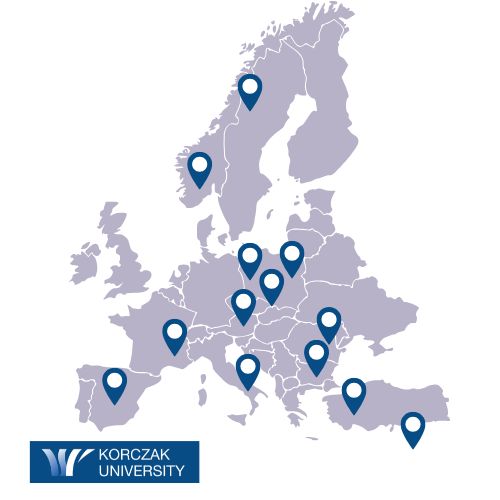
International Projects:
- Seniors Learning Value
- Digital Social Innovations for Young People
- DILASD – Distance learning for students and kids with autism spectrum disorder
- Digital Social Innovation
- Therapy Dog Traning – European standards
- SocialNEET
Our initiatives focus on education and social policy, fostering innovation, knowledge exchange, and real-world impact across borders. From academic partnerships to social development programs, these projects bring together experts, students, and communities to tackle key global challenges. Explore our diverse portfolio and see how international cooperation is shaping the future of education and society.
SEAL – Seniors’ Learning Value
Description: Erasmus+ Project No. 2019-1-IT01-KA202-007593, led by Sistemi Formativi Confindustria SCPA (Italy). Partners included institutions from Romania, Italy, Austria, and France. SEAL aimed at harnessing the wealth of know-how represented by senior workers’ advanced levels of technical skills that can facilitate on-the-job learning processes in VET environments and can dialogue with the education ecosystem stakeholders to transfer companies’ professional needs.
Produced publications:
- Korczak University Report, 2021
- SEAL Report on Senior Learning Moderators, Gilberto Marzano, 2021
- National Action Plan Report on the Senior Learning Facilitator (SLF) Tool, Marek Kawa, 2021
Links:
ELISE – Eliminating Social Exclusion
Description: Erasmus+ Project No. 2019-1-LV01-KA204-060427. There was a need to research information and develop a model for fair travel for families with children with behavioral difficulties, as well as to provide information to both these families and service providers about such opportunities. In addition, recommendations should be developed to ensure fair travel. Korczak University was a partner in an international consortium coordinated by Rezeknes Technologiju Akademija (Latvia), with partners from Turkey, Italy, Bulgaria, and Greece. Produced publications:
Produced publications:
- Focus Research KU, Marek Kawa, 2020
- Family Tourism with Disabled or Special Needs Children in Poland – Report, Marek Kawa, 2020
- Needs Analysis Report, Korczak University, 2021
- Training Report – Intellectual Output 3, Korczak University, 2021
DiLASD – Distance Learning for Students and Kids with Autism Spectrum Disorder
Description: Erasmus+ VET Project No. 2020-1-PL01-KA226-095338. The main aim of the project was to provide teachers working with children with special needs and social workers with the relevant competencies to help pupils and children with ASD and their families through distance learning and the expected social inclusion of pupils and children with ASD.
Produced publications:
- Report, Stefania Szczurkowska, Urszula Bartnikowska, KU, 2022
- Social Robots for Social Applications, Gilberto Marzano, KU, 2022
Digital Social Innovation for Young People
Description: Its main objective was to identify an educational base for online learning in the field of social innovation by bringing together at European level partners involved in topics related to inclusion and social innovation. The project’s activities focused on increasing young people’s knowledge of social innovation, as well as the opportunities that EU funding and digital tools bring in this area. The aim is to allow the development of young people’s ideas, especially regarding services and social innovation, including the promotion of cooperation with social enterprises.
https://dsi-2018-2020.weebly.com/
Therapy Dog Training – European Standards
Description: The aim of the project is to work out the standards of dog therapist training. Creating the European certification system is an innovative and unique project, which may considerably enhance the quality of services, as well as spread and promote the very idea of canine therapy. Among various types of therapy for the disabled, dog therapy has become very popular in Europe. Dog assisted activities are also deployed for educational purposes by teachers and in hospitals by doctors. Dogs are also present in prisons and youth detention centers, where they support the reserialization process. In spite of a large scope of use of these animals, there are no homogeneous standards concerning dog therapist training or therapy dogs’ work.
Link:
SocialNEET
Description: SOCIALNEET nr 2017-1-351 is a project co-financed by the EEA and Norwegian Fund for Youth Employment. The project aims to combat youth unemployment by integrating young individuals (under 30) not in employment, education, or training (NEETs) into the labor market. This is achieved through innovative social economy models across sectors such as tourism, culture, healthcare, IT, alternative energy, and agriculture. The project involves collaboration among organizations from eight European countries and is co-financed by the EEA and the Norwegian Fund for Youth Employment.
Publications produced include:
- Social Capital Measurement Report, Tomasz Plebański, 2019
- Social Economy in the Context of Supporting NEETs, Joanna Sikorska-Waś, 2022
Extending Social Educators’ Competences (ESEC)
Description: Erasmus+ Strategic Partnership Project No. 2018-1-PL-KA204-051126 involved five international partners, including two higher education institutions, with the project leader being the Korczak University in Warsaw, along with a foundation and two NGOs. The ESEC project provided social educators with the competencies needed for designing and running parent training courses in an online environment. It realized an innovative parent training programme for parents of children with behavioral disabilities in order to extend and develop the competence and skills of both social educators and support teachers.
Links:


